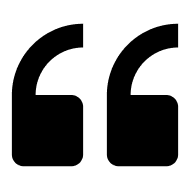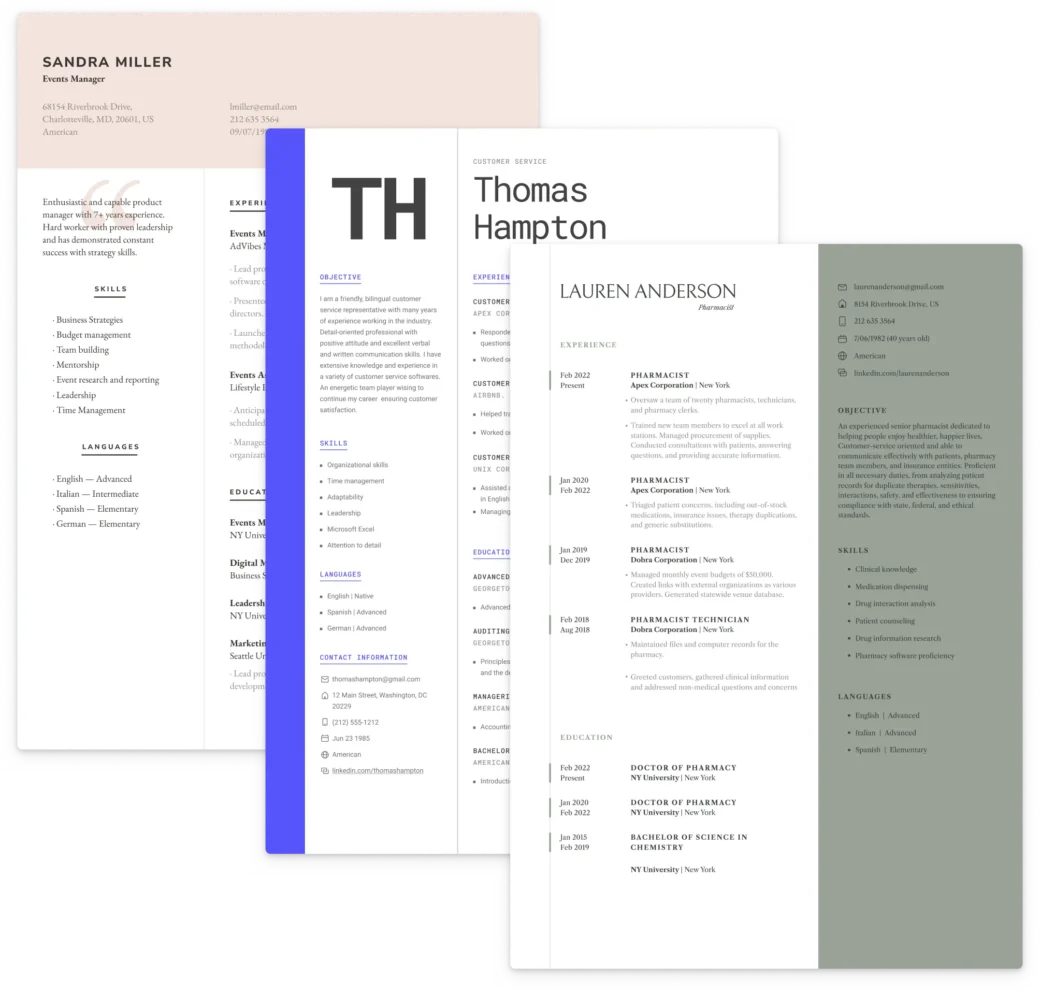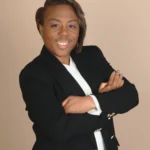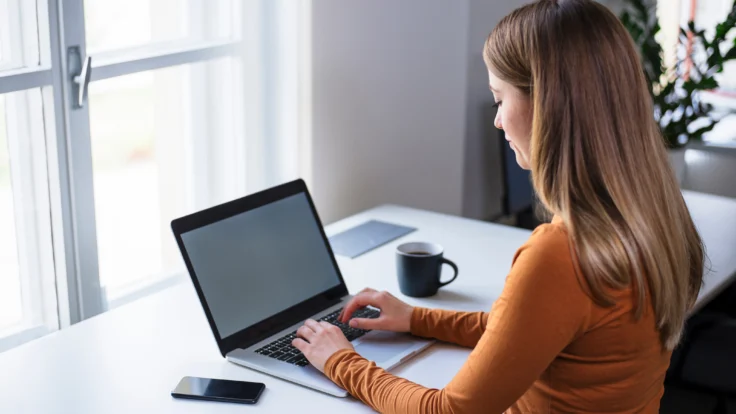Saying “thank you” might seem simple, but in professional settings, it’s a powerful tool for building meaningful connections.
These letters can make a difference in your professional relationships, which may help you extend your network and access opportunities in the future.
In this guide, we’ll show you how to write a professional thank-you letter to a company that stands out, with tips and examples to help you express gratitude in a way that feels genuine.
How To Write a Professional Thank You Letter
Ready to get your thanking cap on!? Learning how to write a formal thank-you letter is more than just about putting the words “thank you” in an email and pressing send.
If you really want to wow potential employers, follow these steps to write a letter that’ll really show your appreciation.
1. Create a clear subject line
Every great thank you note needs to start with a great subject line. Since most thank you letters these days are sent via email, the subject line will be the first thing the recipient reads. If it’s not enticing, they may not even read your note!
A subject line has limited space, so make sure you include just enough information to tell the recipient why you’re sending the email. Typically, you just need the words “Thank You” and either your name, job title, or a combination of both.
Here’s a perfectly acceptable thank you letter subject line:
Thank You – FirstName LastName, JobTitle Interview
You’re welcome to mix it up as you see fit, but that’s all you need for a great thank-you letter subject line.
It’s enough to tell the recipient what the email is about and who it’s from. Adding the job title and a few of the topics you discussed is a good idea for after-interview thank you letters to leave a lasting impression.
2. How to start a thank-you letter
The first piece of text in your thank you letter should be a personal greeting. You want to address the recipient by name to make your note feel more personal.
Don’t use the old “To whom it may concern.” It’s very impersonal and makes the recipient feel like they’re not important.
You can start with the classic “Dear,” followed by the recipient’s name, or you can use any other salutation of your choice. Just make sure it’s professional! Here are a few suggestions:
- Dear
- Hi or Hello (more informal)
- Greetings
- To
You can also simply start with the recipient’s name or with Mr. or Ms. followed by their last name.
If you’re not sure of the recipient’s gender identity, it’s always best to simply use their full name without any gendered terms.
You should also avoid using time-of-day expressions like “Good morning” since you don’t know what time they’ll actually be reading your letter.
3. Show your appreciation
It is a thank-you letter, so be sure to show your appreciation right away. Start your body text with a big old “Thank you for…” or “I appreciate…” and express your appreciation in a sincere and authentic manner.
Let the recipient know that you really appreciate their time, and throw in a few specifics you learned while researching the position or company to make it more personal. Thank you letters are all about being personal!
When showing your appreciation in a professional thank you letter, avoid exclamation points. You’re not writing to your cousin in another state. Keep it professional and avoid abbreviations, slang, or trendy terms.
💡top insight
22% of employers are less likely to hire a candidate who does not send a thank-you note, and 91% appreciate receiving one. Taking the time to express your gratitude pays off!
4. Let them know again that you’re interested in the job
Thank you letters are mostly about being polite, but there’s also another motive.
You want to stay top-of-mind for potential employers. Sending a thank you letter or email after an interview gives you a little head start over the other candidates.
-
💡 Our expert says

Always mention the key points you discussed in the interview. A thank you letter will close the loop to make a final impression.
In your thank you letter, be sure to remind the hiring manager that you’re still interested in the job. This reinforces the idea that you’re serious about the position.
Even if the resume you worked hard on writing didn’t completely wow the potential employer right away, a follow-up letter might make them look back on your resume with fonder eyes.
Of course, if you decide the position isn’t right for you, mention that in your letter, too. The hiring manager will appreciate your honesty, and it’ll save them time in the hiring process.
5. Refer to a specific moment of the interview
When it comes to thank you letters, the more personal, the better. Nobody likes a copy/paste thank you note! To add a more personal touch, mention a specific moment from the interview in your letter.
Talk about some part of the interview that was memorable or particularly interesting. This reminds the potential employer about your specific interview, also helping you stay top-of-mind as they go through the hiring process.
Keep this to a maximum of two sentences.
While you’re talking about the specific moment, remember to mention how your skills and experience relate to the position and how you’ll use them!
6. Offer to bring more information (in case they need it)
The last body section of your thank you letter should be an offer to provide more information.
Even after reviewing your resume and interviewing you, there’s still more a hiring manager might want to know about your qualifications.
Your offer can be something as simple as, “Feel free to contact me for more information.”
It doesn’t need to be a long, drawn-out paragraph. Just a sentence or two mentioning that you’re available to answer any questions they might have.
7. Close and sign your thank you letter
With your letter coming to a close, thank them again and finish it with a professional and sincere sign-off.
Remember to include your full name and contact information, such as your phone number and email address. You can also add extra links to your LinkedIn, website, or professional portfolio, but those are completely optional.
Your close and signature should look something like this:
Thank you for your time.
Sincerely,
FirstName LastName
Email | Phone | portfolio.com
If you want to make sure your resume stands out as much as your thank-you letter, consider trying our AI-powered resume builder for free. It’s designed to help you create a polished, professional resume that highlights your skills and experience effectively.
When To Send a Thank You Letter
Timing matters when it comes to sending a thank you letter.
Ideally, aim to send your thank-you letter within 24 to 48 hours after an interview or meeting. If an interview takes place on a Friday, try to make sure you send the thank you letter over the weekend.
This quick follow-up shows that you’re thoughtful, organized, and genuinely appreciative of the other person’s time.
If you’re thanking someone for a gift, mentorship, or career advice, try to send your letter as soon as possible—preferably within a week. However, if life gets in the way (as it often does), don’t let a missed window stop you from expressing your gratitude.
It’s always better to send a late thank you than none at all.
Regardless of the medium you decide to use, the key is to act while the interaction is still fresh in both your mind and theirs.
Common Mistakes To Avoid
A thank-you letter can lose its impact if you fall into these common traps:
- Being too generic: Avoid vague phrases like, “Thank you for the opportunity.” Instead, reference specific details from your conversation, such as, “I appreciated learning about your team’s collaborative approach.”
- Overly casual language: Keep it professional. Skip informal phrases like, “Hey there!” and opt for polished greetings like, “Dear [Name],” instead.
- Typos and errors: Spelling mistakes or grammar issues can hurt your credibility. Always proofread or use tools like Grammarly to catch errors.
- Focusing only on yourself: Do not make it about what you’ll gain. Instead of saying, “This job would be a great step for me,” highlight how you can contribute: “I’m eager to bring my skills to support your team’s goals.”
- Writing too much or too little: Strike a balance. Aim for two concise paragraphs that express gratitude, reinforce your interest, and mention something specific from the discussion.
Thank-You Letter Template and Examples
Now that you know the parts of a great thank you letter, let’s take a look at some examples of what you might send after a job interview, meeting a networking contact, and a generic letter that’s short and sweet.
First, let’s see an example of a thank you email after an interview:
Example: thank you email after interview
Subject: Thank you – John Smith, Accountant Interview
Dear Ms. Susan Coffey,
Thank you for taking time out of your busy schedule to meet with me about the accountant position yesterday. I genuinely enjoyed learning about your business.
I was particularly interested with how your team worked together using project management software in real-time. I used similar software in my previous accounting role and look forward to using my experience to ensure further success at your company.
If you need any additional information about my background or experience, feel free to reach out. I look forward to talking to you about the position.
Thank you for your time.
Sincerely,
John Smith
j.smith@email.com | 444-555-2222
Example: After a networking contact thank you letter
Here you can read an example of a letter to say thank you to a networking contact:
Hello Mr. Westfall,
Thank you for taking the time to talk to me yesterday at the conference. It was a pleasure to learn about what you do, and I’m excited for the opportunity to potentially work together in the future. I believe my firm’s 20 years of experience will make us the ideal vendor for your business’s needs.
During our talk, you noted that your company needs a better way to manage your thousands of client contacts and send marketing emails efficiently. Our platform is designed to make CRM and email marketing campaigns simple, and our dedication to customer service will ensure you and your team will have all the support you need to ensure marketing success.
If you or your management team have any further questions about my background or experience, or about our platform’s features and usability, don’t hesitate to reach out. I look forward to potentially working together in the future.
Thanks again for your time.
Sincerely,
Marjorie Bauer
m.bauer@email.com | 555-555-6541 | company.website
Example: simple and short thank you letter
For last, let’s see a simple and short thank you letter:
Dear Allison Maybach,
Thank you for writing such a positive job reference for my position at ResumeGiants Software Company. I appreciate you taking time from your busy schedule to think of me and help me create a better future as a software developer.
Your guidance has been instrumental in my success thus far, and I look forward to developing our professional relationship further.
Thanks again.
Sincerely,
Robin Banner
r.banner@email.com | 848-555-6546
Thank-You Letter Alternatives
Sometimes, a traditional thank-you letter might not feel like the best fit. Fortunately, there are creative and personal ways to express your gratitude that can leave just as strong an impression.
Here are a few alternatives to consider:
- Handwritten notes: A handwritten note adds a personal touch that stands out in today’s digital world.
- Video messages: In industries like media or design, a short video message can be a unique way to say thank you. This approach feels modern and engaging, especially for creative roles. Make sure it is attached as a YouTube link.
- Social media shout-outs: In some cases—like thanking a mentor or collaborator—a public acknowledgment on LinkedIn can be meaningful. Share your gratitude in a post while highlighting their impact on your growth or success. However, this would not be appropriate after a job interview.
Choosing an alternative that feels authentic to you and fits the situation can make your message even more memorable.
The key is to focus on sincerity and personalization, no matter the format!
Always Be Thankful
You’d be surprised how far a simple thank you can go.
Writing a professional thank-you letter is a great way to show your appreciation, acknowledge your intentions, and keep yourself top of mind for potential opportunities.
A professional thank you note doesn’t have to be super in-depth. As long as you keep it personal and sincere, your thanks will be well-received.

Build your perfect resume with ease
Craft the perfect resume effortlessly with our builder. Get started today!
Related Posts

